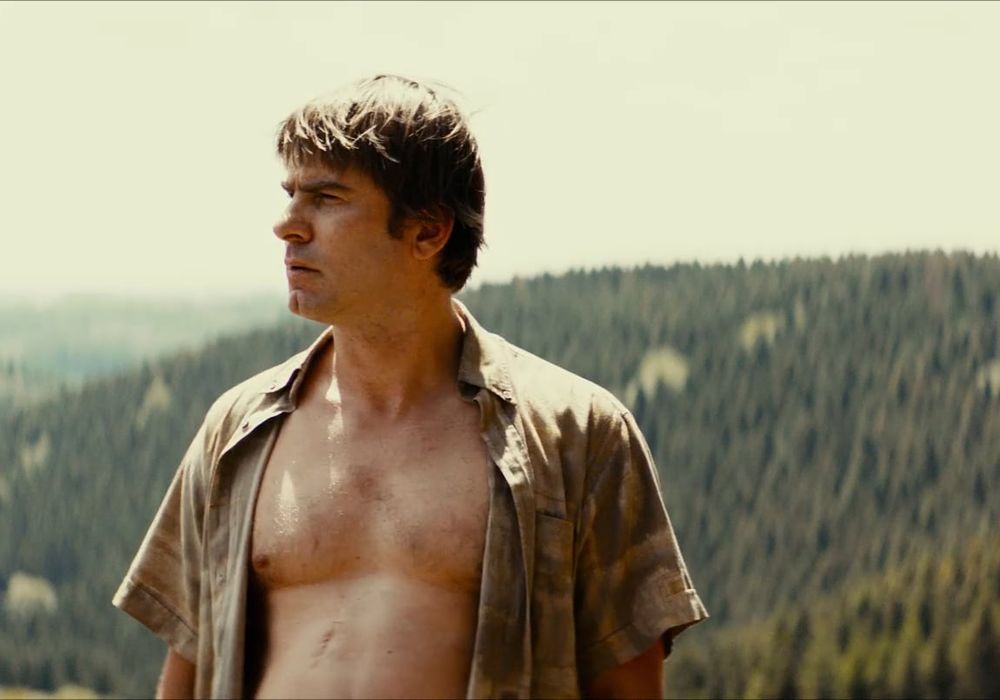Paging Norris McWhirter: Patrick is going for the world record of most full-frontal nudity per square inch of movie. Before anybody gets too excited or riled up, I should point out that the nudity is contextually justified and site-specific. This super-droll Belgian comedy - latest in a long line of super-droll Belgian comedies - is set within the confines of an Ardennes nudist camp. It may be a 1970s nudist camp, if the interior design and some of the pubic foliage is anything to go by; it may just be stuck in the Seventies, cut off from the modern world by the surrounding forest and a let-it-all-hang-out ethos. Either way, director Tim Mielants and co-writer Benjamin Sprengers have, somewhat amazingly, found room among all the bits and bobs both to focus and fashion a bizarrely epic quest narrative. On the very day his father - the camp's owner - passes on, simple fortysomething handyman Patrick (Kevin Janssens) notices that one of his set of hammers has been removed from his workshop. So off he sets, winding his way past nudey well-wishers and unhappy campers to retrieve the missing item. You may start to wonder whether some form of displacement is in play: the hammer surely stands for all that our hero has lost, and everything he hasn't yet found. But Mielants and Sprengers are already ahead of you. "You are going through an existential phase," Patrick is told by Liliane (Ariane Van Vliet), the married woman who jumps on our hero from time to time. Well, yes, but as the tale of a rugged fellow who wants to feel a long, hard tool in his hand again, Patrick also merits immediate recommendation to two possibly not-so-distinct demographics: perverts and psychiatrists.
What a droll, singular film this is. So droll, in fact, that when Jemaine Clement, patron saint of the leftfield comedy, shows up at reception as a bohemian American rocker, he's only the seventh or eighth drollest thing in the movie. It's the plot that keeps tickling you. Returning home from a (fully clothed) dash to the nearest hardware store, where he learns his beloved hammer is no longer on the market and picks up a replacement that doesn't quite have the same reassuring heft, Patrick finds a note pushed under his door that suggests the missing item is being held to ransom by persons unknown. Thus the handyman turns bottomless Poirot, traipsing from tent to chalet to camper van and interrogating the gathered guests as to the hammer's whereabouts. A recurring joke is to pitch our hero, knob out, into the middle of other people's stresses and strains. This has to be the least relaxed nudist camp in cinema history: the death of the owner has raised issues of security and status anxiety that leave everybody jittery, and that errant hammer really isn't helping. Patrick, for his part, bears the vaguest resemblance to one of Will Ferrell's comic disruptions: Janssens has a recognisably Ferrellian look, huffing beetlebrowed, square-fringed and pantsless from one side of the campsite to the other. Yet, hammer or not, he hits all the beats in this story on a downturn. As a character, he's more sadsack than agent of chaos, and he never seems all that far from the brink of some terrible violence. Cinephiles will recall Janssens was the rapist in 2017's Revenge, but you wouldn't have to have seen that film to question just what Patrick wants this hammer for.
The film wouldn't work this well if its main character were merely a joke. We have to want Patrick to find his damn hammer and some measure of peace, and thanks to Janssens' very skilled, oddly internalised performance, we do. It sounds outlandish to call that performance restrained, given that his penis is front-and-centre for much of it, but the purity of this character's love for his hammer (and thus his dad?) keeps Patrick more sincere than snarky or smutty. It's not the only place where you spot how shrewdly the film has been directed, easing it beyond the realm of novelty. A film with this much casual nudity might not have required a keen visual sense, but Mielants (who's cut his teeth on such TV shows as Peaky Blinders) adds the trees that bisect the campsite - and thus the frame - to the many obstacles his protagonist must slalom between. There are shots that are making me laugh even as I remember them, like the slow pan up from a congregation of boules to, well, the boules of the old men tossing them. And I chuckled at Mielants' framing of campsite martinet Wilfried (Pierre Bokma) as a sort of bare-arsed Hitler, who sees the owner's death as an opportunity to push for greater lebensraum; his contempt for Patrick and the masculinity Patrick represents generates one of the great fight scenes of recent times, careening through the limited space of a poorly moored mobile home. Yet, once again, Mielants isn't just here for cheap titters: a cut late on counts among the most unexpectedly potent I've seen this year. There's one other group I should recommend Patrick to, and that's aspirant screenwriters, for whom Mielants' film may provide an education greater than any number of Robert McKee or Syd Field seminars. This is about the simplest story a movie can tell: object goes AWOL, man desires object, man pursues object. Yet it's also proof that with the right script and spirit, and the assistance of very game players, a filmmaker can still fashion one-of-a-kind cinema from the bare essentials.
Patrick screens from today at Cardiff's Chapter Cinema, and is now available to rent via Curzon Home Cinema.

No comments:
Post a Comment